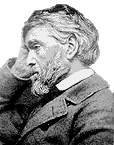 Thomas
Carlyle
Thomas
Carlyle A contemporary of Samuel
Taylor Coleridge and other romantics in Britain, Thomas Carlyle wrote mainly
fictional prose and poetry. However distanced from political theory it
may seem, Carlyle's works and writings reflected his intense views on policy,
with one being able to find political undercurrents throughout much of
his work. As a very romantic thinker, Carlyle attacked industrialism, feared
political radicalism and liberalism, and did not appreciate utilitarianism
or democracy (rule by the people). Being a very pessimistic writer
about subjects concerning Enlightenment-era thinking, Carlyle was extremely
critical of the two main classes involved in ruling, the aristocracy and
the proletariat (working class), were equally at fault for unsatisfactory
government. He thought that the first group, the millocracy (moneyed
class), was insensitive to the suffering of commoners and superficial in
livelihood and lifestyle. On the other hand, the "second group" (or working
class) was merely comprised of "fools full of beer and nonsense," referring
specifically to it's lack of intellectual capacity to participate in any
form or government. Carlyle believed that there were only a handful of
people in the world who were in some way predestined to lead, a sort of
early elitism.
The main theory that Carlyle advocated was that the rule of all life was that life was ruled by inequality. Because of this, he believed that ruling should be left to the most competent members of society, most of which came from the aristocracy. The embodiment of this ruling class would be in the hero, the great man of insight ready to lead society, which he wrote about in his lecture Heroes and Hero Worship (1840). The hero would customarily receive normal acceptance from the masses, according to Carlyle, but could resort to violence when necessary to obtain approval. It was these heroes which defined humankind, and history was but a great biography of heroes. In all aspects, Carlyle could be considered an "anti-liberal" reactionary. He was vehemently opposed to the universal right to vote or any form of popular participation in "public" affairs, thereby advocating strong government control of society to avoid the "anarchy" which he equated to the liberalization of government. Carlyle was invariably a racist, completely anti-Semitic and "Negro-hating" in much of his writing, believing in the "Teutonic superiority" of the Nordic white race.
 Thomas
Carlyle
Thomas
Carlyle